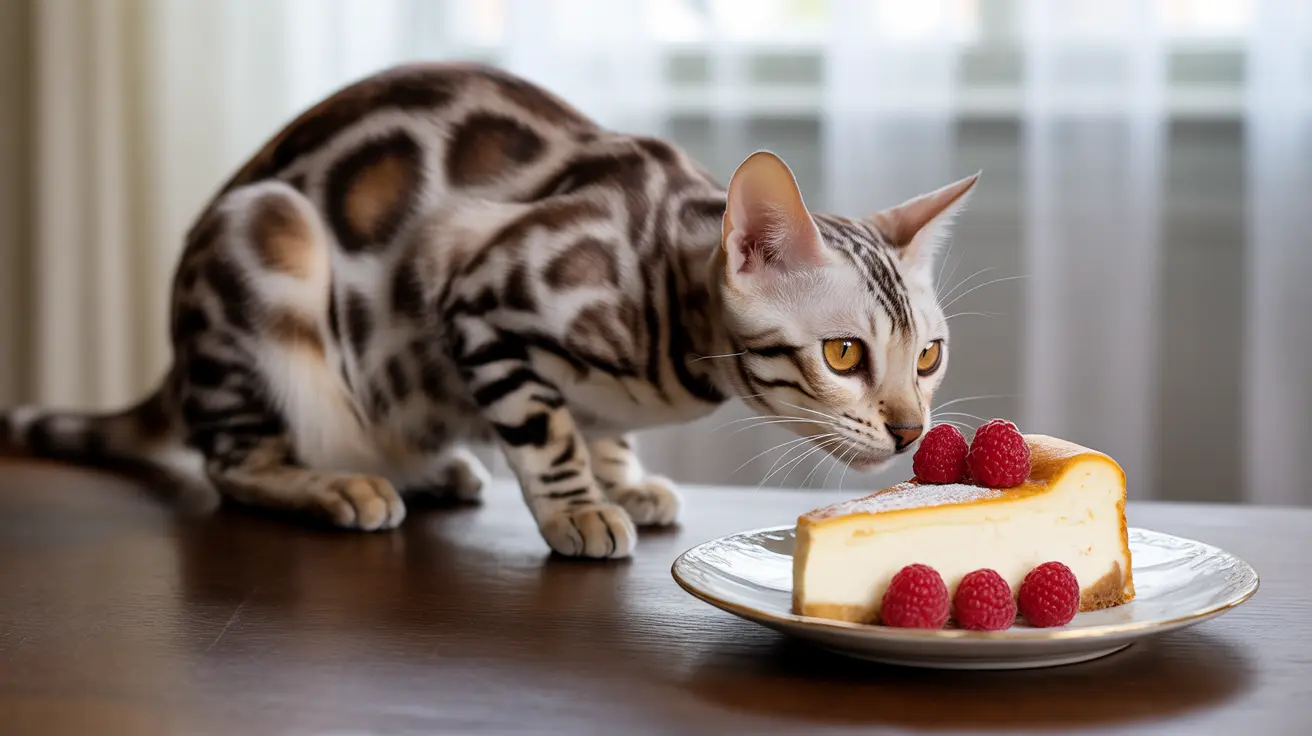If you've ever enjoyed a slice of creamy cheesecake, you might have wondered if sharing a small bite with your feline friend is safe. The short answer is no - cats should not eat cheesecake. This popular dessert contains several ingredients that can be harmful to your cat's health and digestive system.
As obligate carnivores, cats have specific dietary needs that don't align with the ingredients found in cheesecake. Let's explore why this dessert should stay off your cat's menu and what you should do if your curious kitty manages to sneak a taste.
Why Cheesecake is Dangerous for Cats
The main components of cheesecake pose several health risks to cats. The high dairy content, particularly cream cheese and sour cream, can cause significant digestive issues since most adult cats are lactose intolerant. Additionally, the high sugar and fat content can lead to obesity and other health complications.
Lactose Intolerance in Cats
While kittens can digest their mother's milk, adult cats lose the ability to produce lactase, the enzyme needed to break down lactose. This means that consuming dairy products like those found in cheesecake can result in uncomfortable digestive symptoms and potential health issues.
Common Health Risks Associated with Cats Eating Cheesecake
Immediate Health Concerns
- Vomiting and diarrhea
- Stomach upset and bloating
- Lethargy
- Dehydration
Long-term Health Risks
- Weight gain and obesity
- Diabetes
- Dental problems
- Chronic digestive issues
What to Do If Your Cat Eats Cheesecake
If your cat manages to sneak a bite of cheesecake, don't panic. Monitor them closely for any signs of digestive distress. Small amounts may only cause mild discomfort, but larger portions could lead to more serious issues.
Warning Signs to Watch For
- Excessive vomiting
- Prolonged diarrhea
- Signs of discomfort or pain
- Unusual lethargy
- Loss of appetite
Safe Treat Alternatives for Cats
Instead of sharing cheesecake with your cat, consider these healthier alternatives that are safe and appropriate for feline consumption:
- Small pieces of cooked, plain chicken or turkey
- Tiny bits of cooked fish
- Commercial cat treats formulated for feline health
- Small amounts of plain, cooked eggs
Frequently Asked Questions
Can cats safely eat cheesecake or is it harmful to their health?
No, cats cannot safely eat cheesecake. The combination of dairy, sugar, and fat makes it harmful to their health and can cause both immediate and long-term health issues.
What are the symptoms of lactose intolerance in cats after eating dairy products like cheesecake?
Common symptoms include vomiting, diarrhea, bloating, gas, and general digestive discomfort. These typically appear within 8-12 hours of consumption.
Why is cheesecake unhealthy for cats and what risks does it pose?
Cheesecake is unhealthy for cats because it contains lactose, excessive sugar, and fat. These ingredients can cause digestive issues, contribute to obesity, and potentially lead to diabetes and other health problems.
What should I do if my cat accidentally eats cheesecake?
Monitor your cat for signs of digestive distress. If they've only had a small amount, they may experience minor discomfort. For larger amounts or if concerning symptoms develop, contact your veterinarian.
What are safe treat alternatives to cheesecake for cats?
Safe alternatives include small amounts of cooked lean meats, commercial cat treats, and occasional bits of cooked fish or eggs. Always ensure treats make up no more than 5% of their daily diet.
Remember, while it might be tempting to share human treats with your feline friend, it's best to stick to foods specifically formulated for cats. Your cat's health and well-being depend on maintaining a proper feline diet without human desserts like cheesecake.






